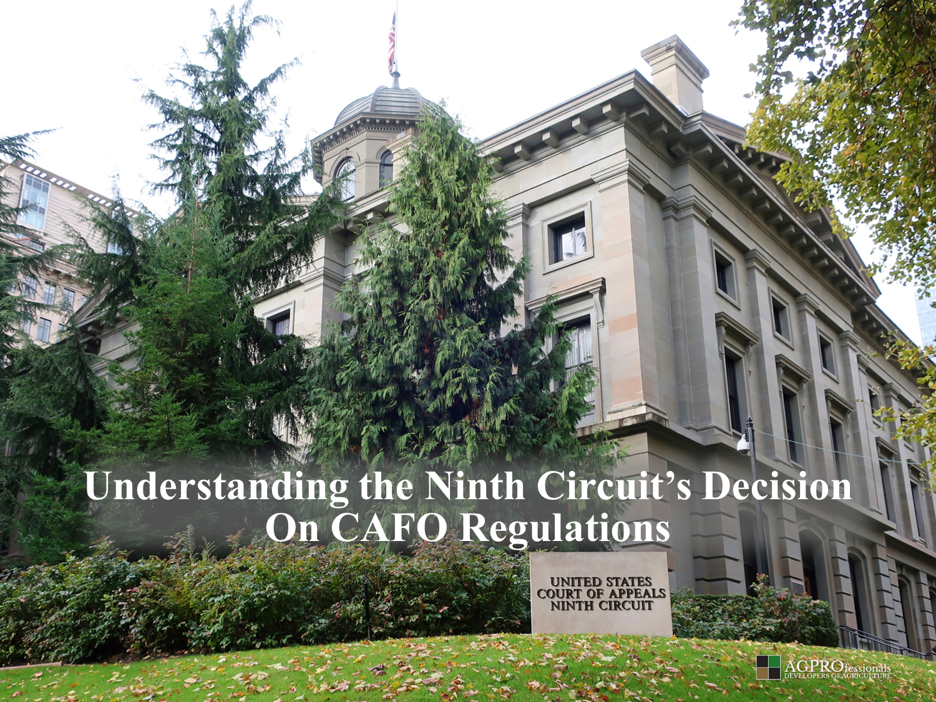Understanding the Ninth Circuit's Decision on CAFO Regulations
At AGPROfessionals, we believe it's important to keep our clients and agricultural industry stakeholders informed about legal, legislative, and regulatory developments that impact us all. Recently, several articles have been circulated discussing the Ninth Circuit Court of Appeals' memorandum over the Environmental Protection Agency’s (EPA) Concentrated Animal Feeding Operation (CAFO) regulations. The memorandum issued by the Ninth Circuit was filed in October 2024 but was unpublished. We wanted to provide some context and explain why this ruling is a positive step for American agriculture.
A Win for Modern Agriculture: Ninth Circuit Affirms EPA's Sensible Approach to CAFO Regulations
What Happened
In 2017, and 2022, the EPA rejected the petitions of several environmental and anti-animal agriculture groups to immediately implement sweeping regulatory changes targeting CAFOs. They were making demands that sought to force the EPA to impose more stringent regulations without proper scientific investigation. The activist groups making the demands included environmental and animal rights organizations like the Humane Society of the United States (now named A Humane World for Animals), Friends of the Earth, Earth Justice, and more.
After the last rejection was issued by the EPA, Food & Water Watch, the Center for Biological Diversity, the Center for Food Safety, and other environmental activist groups sought to file a lawsuit against the EPA with the Ninth Circuit Court of Appeals.
Several agricultural groups stepped up to support the EPA in its decision to decline the demands of the environmental and animal rights activist groups. The American Farm Bureau Federation, National Pork Producers Council, U.S Poultry and Egg Association, and United Egg Producers submitted a brief in the Ninth Circuit as intervenors in the lawsuit.
Fortunately, the Ninth Circuit denied the petition for review submitted by the activist groups. This memorandum by the Ninth Circuit upheld the EPA's reasoned decision to decline the sweeping demands made by the environmental groups, citing the agency's ongoing studies and stakeholder engagement efforts aimed at gathering more comprehensive data. With the denial, the court recognized that policymaking in complex areas like agricultural water quality requires careful evaluation and that agencies must be given discretion to pursue scientifically sound strategies rather than being rushed into action.
Large Modern Farms Comply with a Host of Regulations
Large modern farms operate under a web of stringent federal, state, and local regulations that require detailed nutrient management plans, stormwater runoff prevention measures, water quality monitoring, and more. These operations are frequently inspected and must adhere to the Clean Water Act and other environmental protections.
Moreover, farmers and ranchers across the country continue to innovate, adopting new technologies and best practices that further minimize environmental impact. From precision manure management systems to advanced wastewater treatment techniques, CAFOs are leading examples of how agriculture and environmental stewardship can and do go hand-in-hand.
By allowing the EPA the time and flexibility to pursue thoughtful, evidence-based policymaking, the court has paved the way for smarter, more durable solutions to complex environmental challenges.
For the agricultural sector, this ruling is a positive affirmation of its commitment to responsible stewardship. It recognizes that America's farmers are not only feeding our nation but doing so with a profound respect for the land, water, and communities they serve.
This ruling affirms what the agricultural community has long known: modern farms are operating under already robust environmental safeguards and are committed to continuous improvement.
Links:
Denial on the Justia US Law website HERE
A description of the decision to deny the petition itself by the law firm Mitchell/Williams HERE
Progressive Farmer / DTN article HERE

